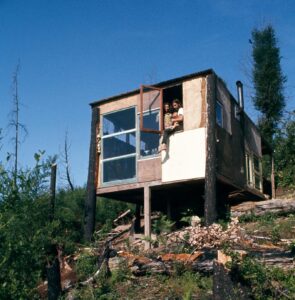By Greg Castillo, CHC Affiliate
 The lazy hippie, one of the most durable counterculture stereotypes, misrepresents the movement’s
The lazy hippie, one of the most durable counterculture stereotypes, misrepresents the movement’s
energetic subversion of the modern construct of work. Industrial societies valorize work
as an income distribution mechanism, a threshold of adulthood, a yardstick of status, and a foundation
of individual identity. Counterculture ideology rejected such instrumental uses of labor
as not only coercive but also unnecessary, given the excess productive capacity of an economy
predicated upon planned obsolescence and competitive consumption. This essay examines how
hippies, in their guise as outlaw builders, radically redefined work. Mobilizing two inherited
middle-class legacies—the ideal of work as a vehicle of self-fulfillment and postwar enthusiasm
for do-it-yourself pastimes and guidebooks—counterculture builders violated the cultural conventions
and legal protocols of construction labor. Hippies redefined the practice of self-building
as a transformative experience open to anyone: the unskilled, the cash-strapped, women and
children, lesbians and gay men. Outlaw builders devised a work culture that fostered collective
identity and individual self-confidence in the process of constructing their back-to-the-land
shelters across a rural archipelago of “liberated territories.”
